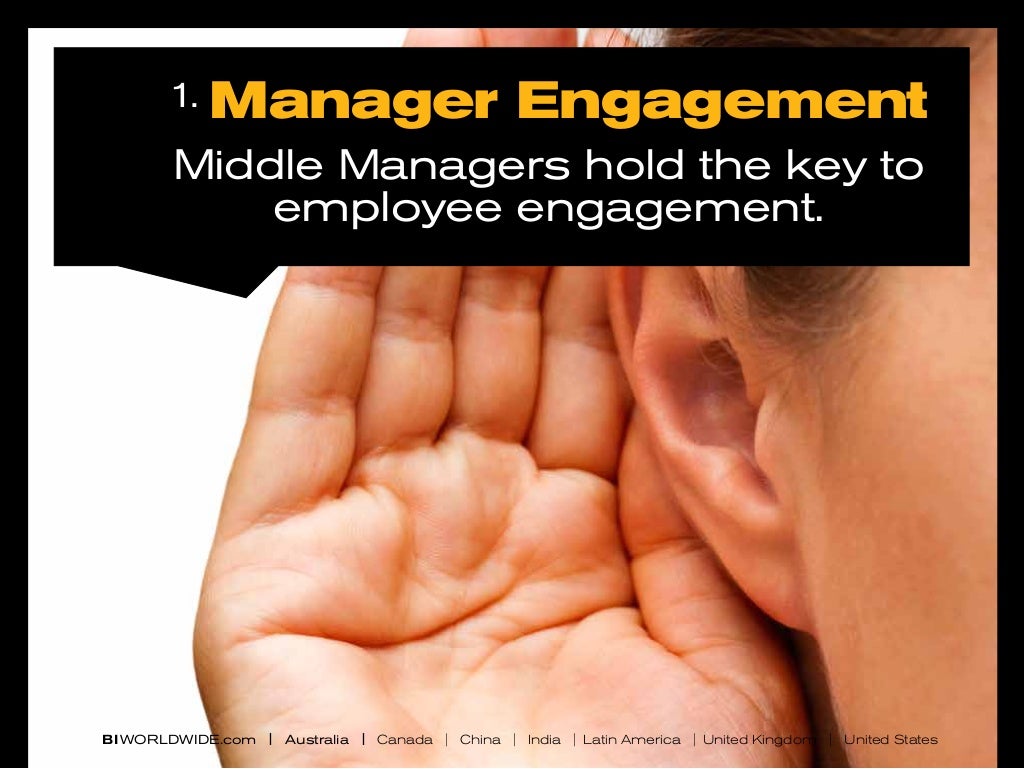How Middle Management Drives Employee Engagement And Productivity

Table of Contents
The Critical Role of Middle Management in Fostering Engagement
Middle managers are the linchpin between senior leadership and frontline employees. Their actions and leadership style significantly influence the overall employee experience and, consequently, engagement levels. Effective middle management engagement strategies are crucial for cultivating a positive and productive work environment.
Creating a Supportive and Inclusive Work Environment
A positive work culture, fostered by middle managers, is paramount for employee engagement. This involves creating an environment where employees feel valued, respected, and supported. Middle managers play a vital role in translating the company's values and vision into tangible actions within their teams.
- Open communication channels: Encourage open dialogue, feedback, and two-way communication. Regular team meetings and accessible managers are essential.
- Fair and consistent treatment of all employees: Ensure equitable opportunities, avoiding favoritism and promoting fairness in all aspects of work life.
- Recognition and appreciation of employee contributions: Acknowledge and celebrate successes, both big and small. Public acknowledgment and individual praise are highly motivating.
- Opportunities for growth and development: Provide training, mentorship, and opportunities for career advancement to show investment in employees' futures.
- Emphasis on work-life balance: Support employees in maintaining a healthy work-life balance through flexible work arrangements where possible and promoting a culture that values well-being.
Effective Communication and Feedback Strategies
Clear, consistent, and constructive feedback is critical for employee growth and engagement. Middle managers must master the art of communication to effectively convey expectations, provide feedback, and address concerns.
- Regular one-on-one meetings: Schedule regular individual meetings to discuss progress, address challenges, and provide personalized feedback.
- Providing both positive and constructive criticism: Focus on both strengths and areas for improvement, offering specific and actionable suggestions for development.
- Active listening and empathy: Truly listen to employees' concerns and perspectives, demonstrating understanding and empathy.
- Transparent communication about company goals and performance: Keep employees informed about the company's overall performance and how their work contributes to the bigger picture.
- Utilizing various communication channels: Employ a multi-channel approach – email, instant messaging, team meetings – to ensure messages reach employees effectively and cater to individual preferences.
Middle Management's Influence on Employee Productivity
Middle managers directly impact employee productivity by setting clear expectations, empowering their teams, and effectively managing challenges. Their role extends beyond simply assigning tasks; it involves fostering a productive and collaborative work environment.
Setting Clear Expectations and Goals
Establishing SMART (Specific, Measurable, Achievable, Relevant, and Time-bound) goals is essential for driving productivity. Middle managers must ensure that these goals are clearly communicated and understood by each team member.
- Defining specific, measurable, achievable, relevant, and time-bound goals: Break down larger objectives into smaller, manageable tasks with clear deadlines.
- Providing the necessary resources and support to achieve those goals: Equip employees with the tools, training, and support they need to succeed.
- Regular progress check-ins and adjustments as needed: Monitor progress regularly and make adjustments to goals or strategies as necessary.
- Linking individual goals to overall company objectives: Help employees understand the connection between their work and the broader organizational goals.
Empowering Employees and Delegation
Empowered employees are more productive and engaged. Middle managers should trust their team members, delegate effectively, and encourage initiative.
- Delegating tasks effectively based on employee skills and strengths: Assign tasks that align with individual capabilities and interests.
- Providing employees with the authority and responsibility to make decisions: Empower employees to take ownership of their work and make decisions within their scope of responsibility.
- Encouraging initiative and creativity: Foster a culture of innovation and encourage employees to come up with new ideas and solutions.
- Fostering a sense of ownership and accountability: Help employees feel a sense of ownership over their work and be accountable for their results.
- Offering training and development opportunities: Invest in employees' professional development to enhance their skills and capabilities.
Addressing Challenges and Conflict Resolution
Proactive conflict resolution is crucial for maintaining a productive and harmonious work environment. Middle managers should be equipped to address conflicts fairly and efficiently.
- Identifying and addressing potential conflicts promptly and fairly: Address issues as they arise, preventing escalation and ensuring fairness.
- Providing mediation and conflict resolution training for managers: Equip managers with the skills to mediate disagreements effectively.
- Creating a safe space for employees to voice concerns: Foster a culture of open communication where employees feel comfortable raising concerns without fear of retribution.
- Implementing effective performance management strategies: Address underperformance promptly and fairly, providing support and guidance to improve performance.
Measuring the Impact of Middle Management on Engagement and Productivity
Tracking key performance indicators (KPIs) helps assess the effectiveness of middle management initiatives and identify areas for improvement.
- Employee satisfaction surveys: Regularly assess employee satisfaction levels to gauge morale and identify areas for improvement.
- Employee turnover rates: Monitor turnover rates to identify potential issues with engagement and retention.
- Productivity metrics (e.g., sales figures, project completion rates): Track key productivity metrics to assess the overall effectiveness of the team.
- Employee engagement scores: Utilize engagement surveys to measure employee enthusiasm and commitment.
- Rates of employee absenteeism and presenteeism: Track absenteeism and presenteeism to identify potential issues with employee well-being and engagement.
Conclusion
Investing in and developing your middle management is crucial for driving employee engagement and productivity. By focusing on creating a supportive environment, fostering clear communication, empowering employees, and implementing effective performance management strategies, you can unlock the full potential of your workforce. Don't underestimate the power of strong middle management – it's a key driver of a thriving and successful organization. Start improving your middle management engagement strategies today and see the positive impact on your bottom line. Effective middle management engagement leads to a more engaged, productive, and ultimately, successful company.

Featured Posts
-
 Bantuan Kembali Ke Sekolah Tabung Baitulmal Sarawak Manfaat 125 Pelajar Asnaf Di Sibu 2025
May 01, 2025
Bantuan Kembali Ke Sekolah Tabung Baitulmal Sarawak Manfaat 125 Pelajar Asnaf Di Sibu 2025
May 01, 2025 -
 Boulangerie Normande Cadeau Exceptionnel Pour Le Premier Bebe De 2024
May 01, 2025
Boulangerie Normande Cadeau Exceptionnel Pour Le Premier Bebe De 2024
May 01, 2025 -
 Stock Market Today Dow Futures Rise Earnings Drive Trading
May 01, 2025
Stock Market Today Dow Futures Rise Earnings Drive Trading
May 01, 2025 -
 Waarom Levenslang En Geen Tbs Voor Fouad L De Dader Van De Schietpartij Op De Erasmus Universiteit
May 01, 2025
Waarom Levenslang En Geen Tbs Voor Fouad L De Dader Van De Schietpartij Op De Erasmus Universiteit
May 01, 2025 -
 La Verita Sul Processo Becciu L Appello Inizia Il 22 Settembre
May 01, 2025
La Verita Sul Processo Becciu L Appello Inizia Il 22 Settembre
May 01, 2025
